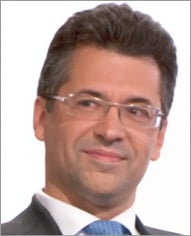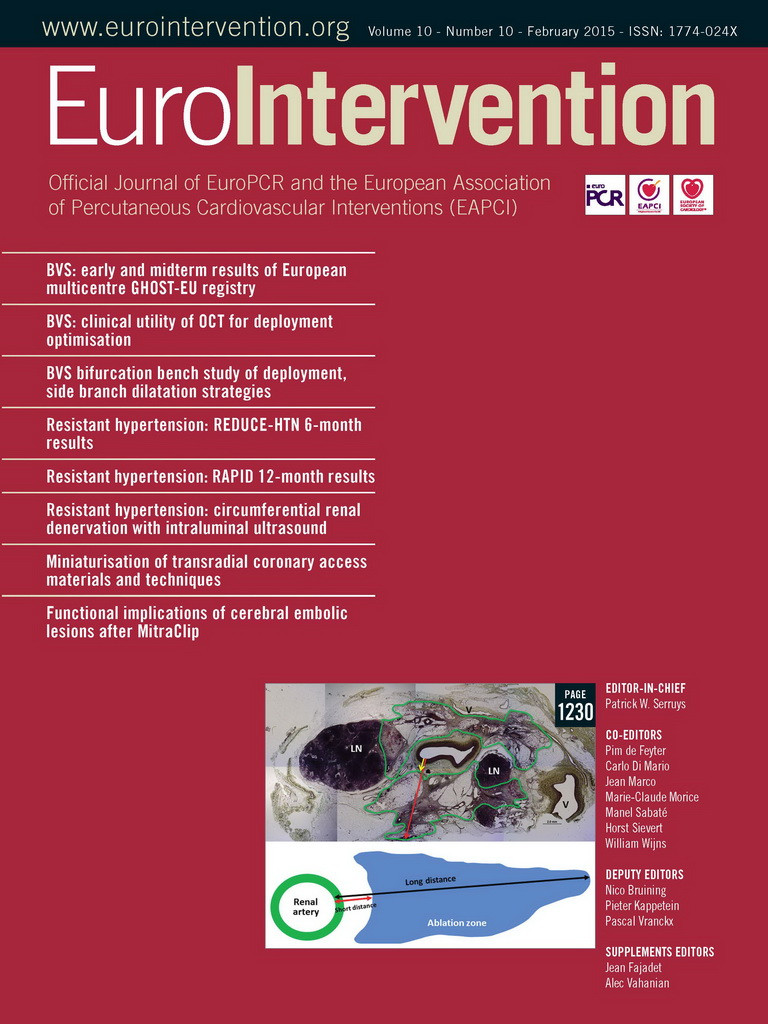NEWS
■ The EAPCI Fellows Course will take place on the 19th and 20th of June at the Heart House, Sophia Antipolis, France. Covering all the core subjects in the interventional cardiology syllabus, it is aimed at medical doctors who have started or have recently completed a programme of training.
■ Also at the European Heart House, the 2015 EAPCI Summit on 23rd March is the yearly meeting for the Presidents and Representatives of the National Interventional Working Groups who will exchange ideas and projects this year focusing on “Mapping Interventional Cardiology in Europe”.
■ Take part in the EAPCI endorsed Resistant Hypertension Course - 3rd edition, 26th to 28th February in Berlin, Germany.
EAPCI Focus on the Swiss Working Group for Interventional Cardiology
An interview with the President, Marco Roffi
What does EAPCI membership mean for a national society?
First of all, Switzerland currently plays a major role in the EAPCI as the President of the EAPCI, Stephan Windecker, is from Switzerland. Our Working Group is naturally very proud of him, as this is a very important position within our profession. Secondly, other Swiss members of our Working Group are very much involved in other key EAPCI positions.
Obviously, we follow the EAPCI/ESC recommendations and guidelines in our daily practice. In Switzerland, interventional cardiology is not recognised as a subspecialty, and we have merely the title of general cardiologists. Until recently, the interventional training was not very well structured: we lacked documentation with respect to training recommendations and minimum number of procedures. Internally, our Working Group devised new national recommendations and interventional requirements, and we based these requirements on the EAPCI/ESC recommendations. So, in this respect, the EAPCI has been very important for us.
Our Working Group actively encourages the use of the ESC eLearning platform. Currently, we advise our fellows to follow an interventional training programme for at least two years; however, we do not offer an official exam or diploma at the end of this training, nor do we sanction individuals if they do not follow specific training recommendations. This means that the trainee has a certain amount of freedom in choosing those elements of the training programme he or she wishes to follow. Nonetheless, we have to make the training stricter through improved standardisation. However, it is very difficult to introduce new standards in terms of training minimal annual volume of procedures. There was an initial reluctance within the Working Group concerning the minimum number of PCIs interventionalists should perform yearly. Some of our members feared that they would not be able to comply with the regulations. We published in 2014 a document stating that the minimum number of PCIs as first operator per interventionalist should be 50 per year and the minimum number of PCIs per centre should be 200 per year. With respect to PCIs for NSTACS with haemodynamic instability or STEMI, the minimum number of procedures required per operator and centre were 75 and 300 per year, respectively.
The Swiss have a long tradition of excellence within our profession, ever since the days of the first PTCA by Andreas Gruentzig in 1977 in Zurich. Unfortunately, he then left Switzerland for the United States. Luckily though, Switzerland has been blessed with more “giants”, with leaders in the field such as Ulrich Sigwart and Bernie Meier.
In summary, we are very active and well represented in both the EAPCI and ESC and we hope to continue the fruitful collaboration in the future.
What are the current issues related to the national society?
The biggest issue we had was only recently resolved, namely the introduction of the recommendation with respect to the minimal annual volume of PCI per operator and center described above. This was a very important moment for us. A second issue is that as a Working Group we are now able to support two national registries, namely for TAVI (SWISS TAVI) and MitraClip (MITRASWISS). This means that the Working Group provides financial support as part of mixed funding with industry. A Working Group member has the lead in these registries. Most Swiss TAVI centres and virtually all MitraClip centres participate in the registries.
Concerning databases, none of the current databases is funded by the government and therefore government funding is definitely a priority for us. There is a nationwide registry on acute coronary syndromes which is named AMIS Plus. This database is not directly supported by our Working Group but it is supported by the Swiss Society of Cardiology as well as by the Swiss Society of Internal Medicine. One of our goals is to have all centers that are involved in primary PCI to participate in the AMIS Plus registry, which is not the case today. Currently our Working Group is participating in a nationwide project called the “Swiss national strategy for cardiac diseases, vascular diseases, stroke, and diabetes”. From our perspective, the main objectives we would like to achieve are a reduction of STEMI mortality with standardised care and implementation of nationwide data collection in form of registries.

Marco Roffi, President of the Swiss Working Group for Interventional Cardiology and Acute Coronary Syndromes
![]()
President: Marco Roffi
President elect: Peter Wenaweser
Contact details: [email protected]
Website: http://ptca.ch
Upcoming annual meeting: Annual Scientific Session of the Swiss Society of Cardiology, 10-12 June 2015, Zurich, Switzerland
Founded: Swiss Society of Cardiology 1948
Interventional Cardiology Working Group 1988
Members: Swiss Society of Cardiology - 950
Interventional Cardiology Working Group - 165
EAPCI members - 85

